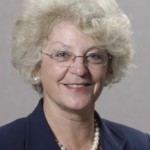Professor Candida Brush Receives Karl Vesper Entrepreneurship Pioneer Award
Babson Entrepreneurship Division Chair and Professor Candida Brush has received the Karl Vesper Entrepreneurship Pioneer Award. The Vesper award is given each year in conjunction with the Experiential Classroom to an individual who epitomizes the concept of an ‘academic entrepreneur’ — a person who with passion and perseverance has enabled entrepreneurship to expand both in its reach and impact. The recipient is a role model for faculty and others devoted to the dissemination of the entrepreneurial mindset.
About The Award
With over 3000 universities and colleges now running serious entrepreneurship programs, the numbers of students studying entrepreneurship and dedicated faculty teaching those students increased dramatically. Paralleling this growth has been the launch of majors, minors, master’s programs, concentrations and specialties in entrepreneurship around the globe. New departments, schools centers and institutes of entrepreneurship continue to appear. Yet, it has not always been this way, and there remain universities whose administration and faculty do not support entrepreneurship education in any sort of meaningful way. Our contemporary ability to have an empowering and transformative impact though these entrepreneurship programs is due to the pioneers who fought tremendous resistance to give birth to the academic discipline of entrepreneurship and to those who have produced and successfully implemented the kinds of innovations that helped the discipline grow in substance and stature. To recognize the contributions of such individuals, the Karl Vesper Pioneer Award was created in 2008. The Karl Vesper Pioneer Award winner is selected annually by a committee of distinguished entrepreneurship faculty, and includes all the former winners. The award was presented during ceremonies on September 20th, 2014.
Remarks From Professor Brush
“When Michael Morris notified me that I was the recipient of the Karl Vesper Pioneer Award, I was incredibly honored. It means a lot to me because I have known Karl Vesper since I was a doctoral student, read most of his work, and spent time learning from him. He is a true “entrepreneurial scholar pioneer”.
So I thought what does this mean for me? By definition, pioneers “explore new horizons, settle new territory and innovate, try new things and foster change”. I started by reflecting on what it meant to me to be pioneering. I chose to study women’s entrepreneurship in the 1980’s when slightly more than 6% of all U.S. businesses were women-owned – 2.3 million businesses. At the time, Entrepreneurship was a fledgling field – the first Babson College Entrepreneurship Research Conference was held in this year (there were only about 16 attendees) – and there was no entrepreneurship division of the Academy of Management (the affinity group was started in 1982). Further, the vast majority of research studies did not include women entrepreneurs and we knew little about the similarities or differences between men and women entrepreneurs or their businesses.
I decided to study women’s entrepreneurship, “exploring new territory”, doing one of the first literature reviews ever published on women’s entrepreneurship in 1991, and conducting the first and largest national longitudinal study of women entrepreneurs in the US. Over the years, I did many more studies and 1998, with 4 other colleagues, I co-founded the Diana Project to study women’s access to venture capital. Why did we study this topic? Even though women entrepreneurs comprised nearly 40% of all US businesses, they only received 5% of the venture capital. We were motivated try and understand why this disparity existed, and to draw attention to this understudied area. Our work over 15 years “settled new territory” evolving into an international forum to study how women growth their businesses. The Diana International Forums bring together more than 100 researchers dedicated to understanding if men and women entrepreneurs and their business performance differs and whether or not these difference matter. A significant body of work is emerging and new theories are being developed. (note – Diana 2015 will be at Babson College next year).
More recently, I authored several policy reports: some for the Global Entrepreneurship Monitor – the Global Women’s Report examining women’s entrepreneurship in 80 countries; and a report for the Goldman Sachs Foundation and Babson College studying the 10,000 Women’s Program and the outcomes of training and education for the 10,000 women who participated in this 43 country educational program. Finally, and we recently updated the Diana Project research examining women entrepreneurs access to venture capital, sponsored by Ernst and Young, and to be released later this month. Notably, this work is disseminated not only in peer reviewed journals, but reports, blogs (I blog regularly for Forbes), practitioner articles, and most recently a new book called Teaching Entrepreneurship: a Practice Based Approach.
My recent work is designed to “foster change” and “innovation”. It is fair to say that my body of work has followed the definition of “pioneering” over the years. As I thought more about this, I realized that we are all pioneers given the nature of the work we are doing. You are here as part of the Experiential Classroom. As entrepreneurial teachers, we are continually “exploring new horizons” as we work to coach and mentor our students to identify, create and develop new venture ideas for future customers and markets. As entrepreneurial researchers, we are always “settling new territory” as we examine new populations of entrepreneurs or new topics like crowdfunding or ecosystems. And finally, as entrepreneurial advocates, we are working to innovate and create change by helping our students, practitioners, policy makers and businesses to apply an entrepreneurial mindset to solving problems.
I am sorry I cannot be there to accept this wonderful award. Please know I am so very proud to be mentioned in the same sentence with Karl Vesper. Many thanks for this wonderful honor, and to all of you “continue to pioneer”.”

